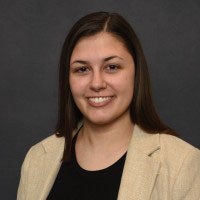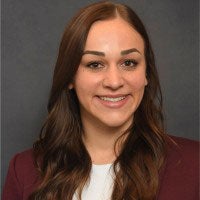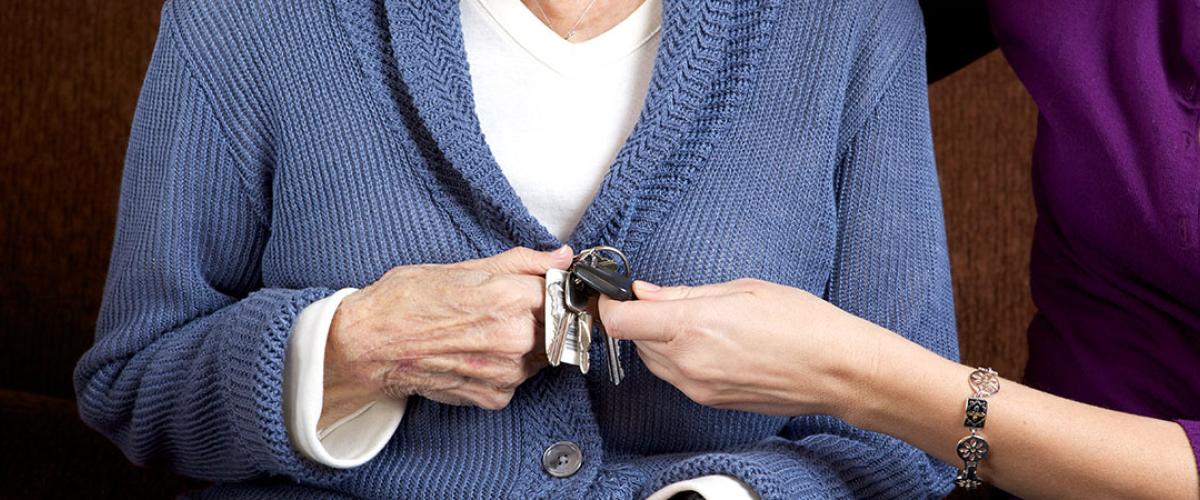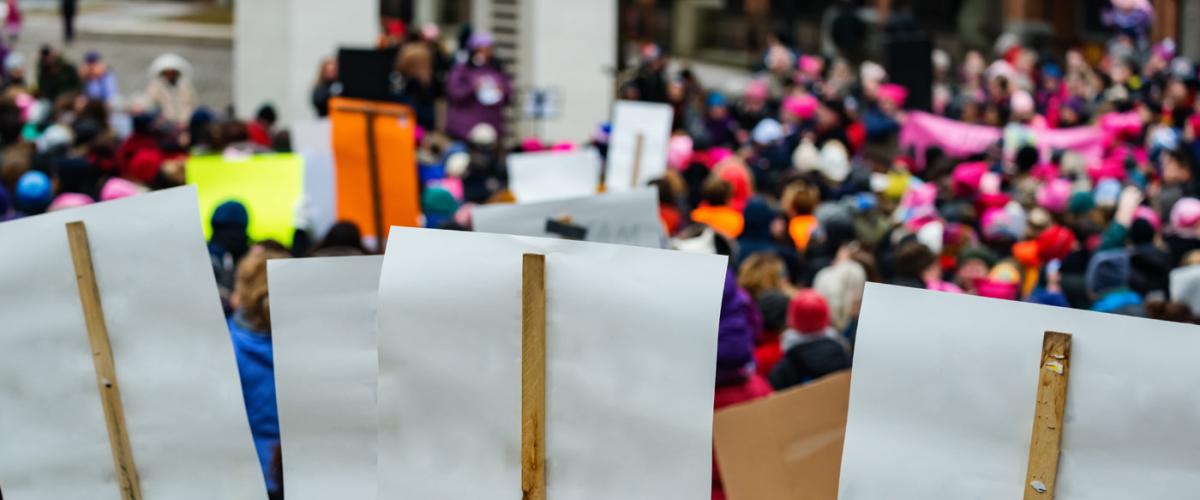Over the summer, a number of students had the opportunity to complete social justice-related fellowships and externships. Here, a few students share their experiences and lessons learned.
Megan Pech
Catholic Charities of Cleveland
For the summer of 2023, I had the privilege of working as a legal extern at Catholic Charities of Cleveland. I worked over 300 hours here and would not trade any minute of it. The nature of this work is hands-on: After two days of training in immigration law-specific information, I was thrown right into work.
Each week, my supervisor gave the other externs and me assignments that were posted by the attorneys, paralegals, and Department of Justice-accredited representatives. Sometimes I would fill out immigration applications for things like asylum, work permits, temporary protected status, and fee waivers. Other times I would be drafting written pleadings, requests for prosecutorial discretion, prehearing briefs, motions to change venue, and more. In working on these assignments, I was able to meet with and interview clients on my own, which has given me a lot more confidence in my abilities as a law student and future lawyer. Depending on the intricacies of the cases, these assignments would go quickly or take weeks to complete.
I highly recommend this externship to other students. I learned so much about the nuances of the law, how to behave in a professional environment, what sort of things you need to keep an eye out for in cases or when meeting with clients, how subjective Immigration Court is, and how to interact with people from all over the world. I talked with many peers who didn't have the opportunity for as much independent and hands-on work as I did.
Every experience has its strengths, and getting your hands dirty is definitely one of the strengths of externing at Catholic Charities. It’s a smaller firm, but you work with the entire staff, which is a great way to make connections and learn different approaches people take to the issues they face working in immigration law.
Some tips that I would share with students interested in this externship are:
- Be ready to hit the ground running with work—you won’t just be on the sidelines;
- Be mindful of how your words, questions and non-verbal communication may affect the clients—many, if not all of them, have survived serious trauma; and
- No matter what opinions or knowledge of immigration you have, you will certainly be surprised by what you learn here (in both good ways and bad).
The people you meet here will change the way you view the world. As a white, middle-income, non-immigrant, I entered this experience knowing that I knew little about what it’s like to be a person of color, low-income, and/or an immigrant in the U.S. I am glad I had the opportunity to work with such a diverse group of people who have so much knowledge and wisdom under their belts. My time at Catholic Charities has further affirmed to me that public interest and social justice are the path for me.
Yuqi Sun
Catholic Charities of Cleveland
My internship in Catholic Charities of Cleveland's Immigration Legal Services (ILS) was meaningful, educational and fulfilling. We worked on real immigration attorneys' and paralegals’ work. We met with clients. And, most importantly, our work helped the clients.
ILS is a friendly and inclusive organization that would be a great starting point for law students. It may be especially helpful to international students because mastering a foreign language is preferred here, and ILS has a pattern of hiring international students. As many law firms are becoming more reluctant to sponsor international students’ work visas in the future, ILS is a great place for international students who are interested in private practice.
ILS operates as a law firm. It uses a sophisticated case management system, LawLogix (“LLX”). Interns must docket their time working on a client’s case in LLX.
ILS sets stages in serving clients. ILS has many potential clients waiting because it is pro bono. Clients have to meet with intake specialists first to give their basic information. The intake specialist will check if the client has a court date so the attorneys would know if that client has an urgent need. The intake specialist will also check the client’s way of entering the U.S., the date of entry, and whether they suffered any kinds of mistreatment in their home country and in the U.S. so the attorneys will know if the potential client is likely to be qualified for all different kinds of immigration benefits.
After intake, attorneys will give consultations to qualified clients. The clients will sign consultation contracts with the ILS, and they may also sign service contracts with ILS if they decide to work with the attorneys within 90 days. ILS invites interns to observe the intake and the consultation to learn the process of taking in new clients, which is essential to private practice.
I learned immigration law from the training materials while also observing the consultations. After the first week, which was the training week, the supervising attorney assigned me to work on real projects. I wrote a pre-trial brief for the removal defense. I completed many forms for green card application, asylum, U-visa, re-parole, and family reunification. I attended two asylum clinics, where I helped pro se clients to prepare the I-589 form and briefly guided them on how to prepare for asylum interviews. To complete the forms, I met with clients in person and talked to them over the phone.
I coordinated three big Afghanistan families to come into the office and sign the forms and legal contract. I spoke to an oppressed gay person, an engineer whose family was targeted by Peru gangs, a young woman whose brother was shot in front of her eye, two women who suffered domestic violence, and Ukrainian parolees whose homes are now a war zone.
Talking to clients is a valuable experience for international students. It improved my English communication skill, helped me overcome my phone phobia, trained my social skills and, more importantly, let me see other’s struggles and firmed my dedication to social justice.
After this summer, I am confident I am prepared to greet clients, ask for their information and documents, explain legal terms to them, and provide brief legal advice. I built my foundation in ILS and readied to face bigger challenges in my second summer.
ILS really treats students as one of their own. A great summer experience is guaranteed.
Kristin Elnikar
Federal Trade Commission
Following my first year at Case Western Reserve, I accepted an externship with the Federal Trade Commission’s East Central Regional Office in Cleveland. My passion for public service and my interest in government work led me to the Federal Trade Commission, and I am grateful I had the opportunity to work alongside the attorneys who are protecting consumers from unfair and deceptive acts and practices in the market.
The Cleveland office solely works under the Bureau of Consumer Protection. I was unaware of this when I accepted the position, but it was mostly remote. The staff only went into the office one day each week, so I was working from home most of the summer.
The FTC is a government agency, and therefore there are numerous rules employees (and externs) must adhere to. My first couple of weeks were filled with trainings and presentations regarding discretion and the structure of the organization. I had the opportunity to hear from attorneys from both the Bureau of Consumer Protection and the Bureau of Competition throughout the summer in weekly virtual trainings. Externs from offices across the country were also in attendance at these meetings, and I enjoyed learning where my peers were in school and what their backgrounds were.
In addition to the virtual presentations, I worked on numerous research assignments and trial preparation tasks alongside the attorneys in the office. One particular assignment I enjoyed working on was the FTC’s Protecting Older Consumers Report. The report is published annually by the FTC to highlight unfair or deceptive practices in the marketplace which disproportionately impact older consumers. I looked at the previous fiscal year and found cases the FTC had resolved that disproportionately impacted older consumers—for example, deceptive marketing of joint supplements.
Working on this report allowed me to gain an understanding of how the FTC balances public perception while working behind the scenes to litigate against companies that have violated the FTC Act. The Protecting Older Consumers Report puts summaries of case resolutions together for the public to have a glimpse into the actions the FTC has taken in the previous year. The FTC is subject to public scrutiny routinely, so having guides and resources that are easily digestible published are a way the commission connects with the public to spread awareness of its consumer protection mission.
My supervising attorney is on a team for a case going to trial in September, so there were many opportunities to learn about trial preparation and motion deadlines. I was surprised how quickly these deadlines came up. In my time there, I got to assist on a motion to dismiss, a motion for summary judgment, witness preparation, exhibit preparation, and a motion in limine. I was quite nervous about tackling assignments and learning how to be a law clerk from home, but the attorneys were very responsive with emails whenever I had questions and were thorough in their assignment requests.
It was not ideal to work from home my first summer externship, because it is significantly more challenging to establish relationships with the attorneys via email. I made the most of it, and the attorneys were sympathetic to the challenges of working virtually. It was a laidback environment, and deadlines were made clear to me if there was an assignment that needed to be completed hastily. There was never an assignment given to me that I was unable to complete and guidance was always available.
Also, I was able to participate in a mock deposition in the office. The other extern, Molly, and I received a case file our first week, and had several weeks to prepare for a deposition of a witness in the fictional case. It was nerve-wracking, but it was an incredible learning experience and was a great opportunity to interact in-person with the attorneys in the office.
Overall, I would recommend this externship to anyone interested in public service work. The attorneys are incredibly bright and friendly, you just have to get comfortable putting yourself out there in a virtual environment.
Matthew Liu
US Together Cleveland
US Together was established in 2003 as a nonprofit 501(c)(3) mutual assistance agency, aimed at addressing the needs of refugees and immigrants in central Ohio. Its mission is to facilitate, organize, and initiate a wide range of services for refugees and immigrants, including education, advocacy, legal support, information, referrals and networking opportunities. The organization strives to strengthen Ohio's immigrant community and promote international understanding through intercultural exchange.
As a law clerk at US Together Cleveland, my responsibilities entailed assessing clients' eligibility for immigration legal relief and following up on their requests. Additionally, I was responsible for completing various immigration petitions for the Executive Office for Immigration Review (EOIR) and U.S. Citizenship and Immigration Services (USCIS). This includes drafting motions for the immigration court (EOIR) and preparing court briefs, such as asylum briefs. I review, examine, and verify the documents provided by clients through research.
Data entry is another common task I handle, as immigration involves a lot of form fillings. Thanks to my previous experience in an immigration law firm, I am familiar with different immigration forms, such as I-485, I-130, and the most important one for refugees, I-589. Moreover, I have the opportunity to attend and even conduct interviews with both new and existing clients, as well as EOIR calendar hearings and USCIS interviews.
The staff and supervisors here are extremely friendly, providing a relatively comfortable and flexible working environment. The only attorney, Frank, is passionate and always eager to coach and guide. The diverse background of the staff, including individuals from Afghanistan and Ukraine, enriches my international understanding through cultural exchange.
One interesting case I observed and researched was whether a parent's death constituted child abandonment. The internship allows for abundant time and minimal supervision, which enables you to delve deeper into the cases you handle.
I would recommend this opportunity to students who want to expand their international vision and are interested in practical legal aids for refugees and asylum seekers.
Allison O’Rourke
Catholic Charities of Cleveland
As externs at Catholic Charities of Cleveland's Immigration Legal Services, students get firsthand experience with what immigration lawyers and paralegals do every day. At the beginning of the externship, I observed a lot of consultations to learn what immigration attorneys do and the typical cases they handle. I received assignments weekly that either centered around writing, research, client communication, or a combination of these.
This summer, I got experience with the filling of forms I-131, I-589, N-400 as well as reviewing and signing them with the clients. I also drafted asylum briefs, SIJS forms, a scheduling order response and written pleadings, a motion to continue, a motion to terminate and a closing letter. I got to research country conditions for Venezuela, Honduras, Cameroon, Belarus, India, and Sudan. I got to do legal research on T visas for an attorney. Lastly, I prepared exhibits for ECAS submission for a client’s upcoming merits hearing.
My favorite part about the job was writing asylum briefs. For an asylum claim, a person has to show that 1) they were persecuted by the government or someone the government is unwilling to protect them from 2) on protected grounds and that they fear future persecution. First, I would read through the client’s file creating a fact statement with everything I would need to establish these elements. Then I would research the country to try to find corroborating evidence that the government has done this to other people with the same protected grounds, such as religion, race or nationality. Usually, each brief had common characteristics as a case Catholic Charities had already done so I had a strong sample to go off of, but would have a few unique differences that I got to do research on.
Outside of legal work, I got to know the employees that work at Catholic Charities. They were all very friendly and willing to help at any time. The externs also got to attend a merits hearing of an attorney’s client at the Immigration Court in downtown Cleveland. I had a great experience with the people and with the work. I would recommend this externship to anyone who wants to interact with clients, conduct independent work on important assignments, and learn about different countries.
The following are some tips I would give future students in this position.
- Before meeting with a client, do as much preparation as possible.
- If someone’s answer is different from what you thought it might be, try rephrasing the questions before you move on.
- When writing an asylum brief, make sure to ask for a sample brief before beginning.
- When completing any assignment, keep a list of questions you have and move on.
- Try to finish as much as you can on the assignment before asking your questions for efficiency because the attorneys are very busy and also, I have often answered the question myself later.
Again, I recommend this internship and have learned a lot.










